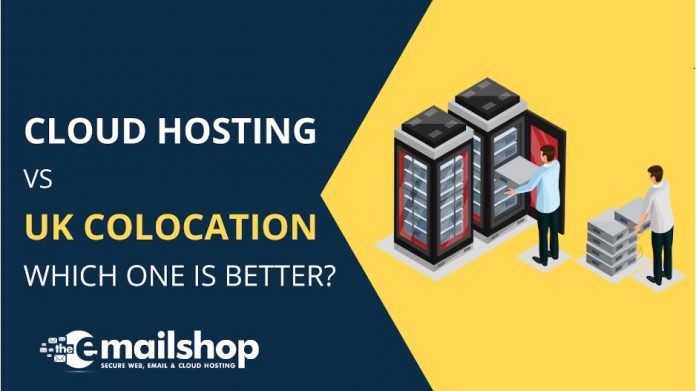Although UK Colocation is a reasonable option for businesses that have already invested a significant amount of money and resources into their IT infrastructure, it is not the optimal answer for businesses that have not yet made those kinds of investments. In order to choose any information technology (IT) related products, software, or servers, we need to be aware of both the benefits and the drawbacks associated with them. By carefully weighing the benefits and drawbacks of each alternative, we will be able to pick the one that is most suited for our business and requirements. Therefore, if you want to pick only one option from cloud computing and colocation, we will examine in depth the benefits of each choice and perform a side-by-side comparison of the two. But before we get into it, let’s start by providing a quick overview of the cloud and colocation.
Table of Contents
Cloud Computing
Hosting in the cloud is a solution to this problem. To put it another way, cloud hosting is a service that is given by a third-party host in which an organization migrates its data and applications from its own physical servers onto the virtualized servers that are supplied by a cloud provider. After that, the day-to-day administration of storage, servers, and networks is turned over to the cloud provider, which enables corporate IT staff to concentrate their efforts on other areas of concern.
UK Colocation
Instead of storing servers on their own premises, companies may save money by using the Colocation UK service, which enables them to rent space in a third-party data center to store their own gear.
In many cases, businesses have already made substantial expenditures on their physical IT infrastructure, which may include the purchase of hard drives, servers, and other resources. The enormous power and cooling needs that come along with this equipment, as well as the expenditures that come along with them, present a difficulty when it comes to storing and maintaining this equipment on-site.
When a firm utilizes colo, it installs its own hardware in a data center that is owned and operated by a third party. As a result, the company is solely responsible for the installation, setup, and upkeep of its servers. Typically, the data center will charge you a fee on a monthly basis in exchange for providing you with floor space (which may or may not include racks), network connection, electricity, cooling, and safety.
The Advantages Of UK Colocation
Cost-effective
The operation of an established IT infrastructure on-site might be a very expensive undertaking. It has been shown to be an efficient strategy to control IT expenditure and reduce the total cost of ownership (TCO) for a company to make the switch from managing IT services in-house to outsourcing them to a data center. This shift was made possible by the adoption of the cloud computing model. UK Colocation offers businesses a comprehensive plan, which typically comes with a fixed rolling fee, that encompasses support, redundancy, security and connectivity all-in-one while cutting the cost of utility bills, infrastructure, and physical space.
Scalability
The degree of personalization and adaptability of the solution that is provided is directly proportional to the value that is provided by UK colocation. When a company chooses to colocate its operations in a data center, it is only required to pay for the resources that it requires at that particular time. Nevertheless, this does not indicate that there is no space for growth or expansion. Because each and every colocation facility has the capability of expansion, this implies that companies have the opportunity to develop or extend into their space in order to meet the ever-changing requirements of both their company and their customers.
The Most Cutting-edge Facilities Are Available
Data centers provide high availability and uptime, and they include redundant power sources and emergency generators to ensure that they are always operational even in the event of a power outage. UK colocation providers serve as the entry point to real network superhighways, making available a comprehensive range of connection choices from a variety of service providers. When compared to hosting your own infrastructure on-premises, using one of these solutions results in increased bandwidth and decreased latency.
Recovering After a Disaster
The implementation of a disaster recovery plan and the backup of your mission-critical data may also be made possible using colocation. Data might be lost or destroyed if your IT infrastructure is stored on-premises, which is risky since natural disasters can strike at any moment. By replicating your data in different data centers, you can ensure that even in the event of a disaster incident, your data will be safe. The applications that are most important to your business will continue to operate normally.
The Advantages of Cloud Hosting
Reduced Initial Financial Expenditure
A company that wants to extend its IT resources outside the computers in its own office may access the cloud by adopting an OpEx model, which is in contrast to the CapEx approach, which entails purchasing actual gear. Customers only pay for the resources that they actually use and may scale up or down depending on the requirements of their company due to the fact that the majority of cloud providers provide “pay-as-you-go” models.
Flexibility
The cloud is far more adaptable than a conventional IT infrastructure due to the fact that it is not a physical location. The benefit of using cloud hosting is that it can adapt to fluctuating demand, which means that you will only pay for the number of resources that you actually use. Such resources can be easily scaled up or down; for example, if you anticipate a rise in traffic, you can scale up your capacity to satisfy the increase. Or if an organization needs to increase its capacity to develop a new application or store more data, it can simply contact its cloud provider to increase resources.
A More Environmentally Responsible Strategy
Since you are only using the server resources that you really want, cloud hosting is a more cost-effective and environmentally friendly approach to operating your website or application since it frees you from the limits of a physical server. Therefore, you are having less influence on the environment as a result of your efforts to streamline the way in which you utilize data and resources.
Reliability
If all of your website’s data and computing power are saved on a single computer at your workplace, and that machine is destroyed in a disaster such as a fire or theft, then your website will no longer exist. When using cloud hosting, a high uptime is automatically included in the structure of the service. If your website is hosted on a network of computers that are linked to one another, then if one of those computers goes down, the others in the network may take over and keep your website accessible to users.
Cloud Vs. Colocation
Cost
Because the user is responsible for purchasing the necessary hardware for UK colocation rather than moving their data to a cloud server, the initial cost of colocation is much greater when compared to the cost of a cloud-based solution. However, owing to the way that public cloud services are priced, the prices have the potential to skyrocket very fast in response to surges in customer demand as well as fees associated with bandwidth use. Because it is often provided on a set payment basis, a private cloud is a suitable choice to consider.
Management
Colocation facilities are similarly multi-tenant, but in contrast to a public or private cloud, colocation facilities do not provide their tenants with managed services. Instead, the only space that the tenants lease in the cheap colocation UK facility is either floor space or rack space. The renter has complete autonomy in determining how they will use the area that they have rented.
Functionality
The function is the primary distinction between colocation and the cloud. A colocation facility performs as a data center that leases floor space to an organization, while the cloud enables users inside an organization to act as tenants.
The Pooling Of Resources
The difference between cloud providers and colocation providers is that cloud providers offer virtually shared public resources, while UK colocation providers offer shared space within a data center. However, the resources contained within the cages are not shared; rather, they are dedicated to the organizations that own the cages. In a colocation facility, the only resources that are shared are the power systems, the cooling systems, and the security systems.
Responsibility
When using the cloud, the data is maintained virtually on servers that are owned by the cloud provider. When using colocation, on the other hand, servers are not owned by the facility that is leasing the space but rather by the company that is leasing the space. If you decide to go with a colocation solution, you will be responsible for the upkeep and replacement of any hardware that breaks down over time. If you choose a cloud-based option, the service provider will take care of all software upgrades and data management.
Which of These is the Best Fit for Your Business?
Businesses don’t always have to choose between colocation and cloud computing, despite the fact that it may seem as if they must in order to make a selection between the two options. These two distinct approaches to website hosting are not mutually exclusive options. When it comes to IT, many businesses that have chosen to implement solutions hosted off-site make use of a mix of colocation and cloud hosting services. The selection is going to be based on the particular goals of the organization, the requirements of the stakeholders, and the available IT budget.
When you use cloud services, the cloud service provider manages your servers, storage, and network so that you can access the data. When using cloud storage, the provider is the one who is responsible for building up the necessary infrastructure, rather than the company itself. When using colocation, organizations are required to put up their own networks, servers, and storage facilities. The flexibility of cloud services to swiftly scale data capacity up or down in response to changing business requirements is one reason why some businesses choose to store their data in the cloud.
Cloud providers provide the advantage of storing and managing data for organizations, but the prices for hosting that data grow as the data expands. Businesses may profit from using cloud providers to store and manage their data. More data requires extra storage space and will incur additional fees. Although companies may pay hardware costs up front when using colocation, these costs will decrease over time since they will only be renting space for their servers and other data storage equipment and not the data storage itself.
Cloud computing and server colocation both provide organizations with a variety of options for storing and managing their data. However, despite the fact that a colocation or cloud solution on its own may be the optimal choice for many businesses, it is essential to keep in mind that these two methods of implementing IT infrastructure are not mutually incompatible. Using a mix of the two in a hybrid or multi-cloud environment enables organizations to profit from the most advantageous aspects of both environments, provided that the implementation takes place inside a secure data center setting.
Colocation is supposed to be able to offer more robust security measures than cloud computing, although it lacks the mobility of cloud computing. Colocation solutions can be a good fit for businesses that require a high degree of control over their hardware and the workloads that are hosted on it, whereas the cloud can be a better fit for businesses that perhaps do not have as much expertise in-house and would rather have a third party handle such tasks.










